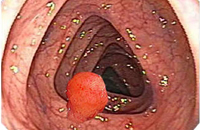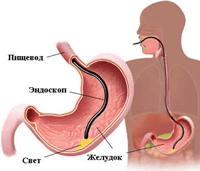If the polyp colon is not removed, it can cause colorectal cancer. But, meanwhile, to detect this very polyp sometimes oh how difficult it is - it does not hurt! What are the reasons for the development of the colon polyp and how to identify it, the author of this article knows.
Content
Polips colon and causes of their appearance
The attention of coloproktologists of all over the world is riveted to the colon polyp,
Since intestinal cancer in the overwhelming majority of cases develops
from benign polypa.

An important role in the development of colon polyps is played:
- hereditary factors;
- Chronic somatic diseases contributing «aging» epithelium of the mucous membrane of the colon;
- Features of nutrition;
- constipation.
In addition to hereditary factors, the growth of polyps and malignant reincarnation contributes to the use of a large number of animal and oily food and constipation. Animal fats and proteins lead to the formation of carcinogenic substances in the intestine, violating the renewal of the cells of the mucous. Constipation contribute to the long action of such substances.
In addition, each third of patients with polyps observes rectal bleeding. Moreover, the larger the size of the polyp, the more often the bleeding.
Village tumors make up 15% of all benign tumors of colon and most often located in the rectum (up to 80%). The large sizes of these tumors, the tendency to ulceration and damage predispose to rectal bleeding.
The problems of polyps are engaged in a gastroenterologist. Timely diagnosis and treatment of polyps prevents the development of colon cancer.
The main method of diagnosing polyps colonoscopy is the inspection of the intestine area to one meter using a special endoscope introduced into the rear pass. This procedure must be subjected to every person over 50 years old. If in the family there are cases of diseases of the colon cancer, then it is necessary to perform a colonoscopy regardless of age.
Before the colonoscopy, the doctor may assign:
- Hidden blood analysis on hidden blood;
- irrigoscopy - X-ray study of the intestine with the help of a contrast agent introduced by enema;
- RectorOnoscopy - a procedure similar to a colonoscopy, only inspects the intestine section to 30 cm.
Timely removal of small, almost always asymptomatic colon polyps - the basic measure of the prevention of colon cancer.
Surgical treatment of colon polyps is carried out using endoscopic equipment. A flexible endoscope is introduced into the rear pass (a colonoscopy is carried out by such an endoscope), equipped with a loop electrode, which is captured and pinch the floor of the polyp. Large polyps are removed by parts. Remote polyp is sent to histological examination, which allows you to determine under the microscope, is there a malignant transformation in the polype or not.
Endoscopic removal of polyps is well tolerated, after operation, working capacity is restored the next day.
After removing the polyps of large sizes (more than 2 cm) or multiple polyps (5 or more) and the vellented adenomes of any size requires control endoscopy in a year. If new polyps are not detected, the colonoscopy is repeated every three years.
The preventive removal of the colon polyps is an effective means of preventing colorectal cancer, and prevents colon cancer in 99.55% of patients.









